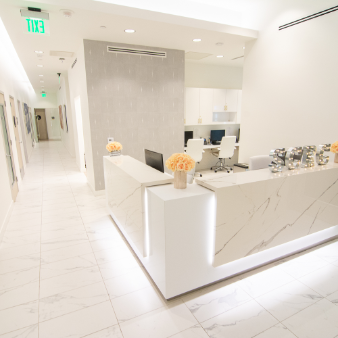Late last year, famous TV uncle John Stamos was excited to announce that he and his then fiancée, Caitlin McHugh, are expecting their first child. At 54, Stamos falls on the older side of the scale for a new dad. He’s certainly not alone. Both men and women are delaying parenthood, with the average age of first time parents climbing all the time. Currently, in almost 10% of all U.S. births, the father is over the age of 40, a percentage which has more than doubled since 1973 when that number was only 4.1%. Fathers over 50 are still outliers, however, accounting for a little less than 1%. The links between maternal age and fertility have been deeply studied and these findings get a lot of media coverage, but are there risks that potential older fathers should be aware of?
Paternal age: What are the risks?
Stamos was ecstatic about the news of his upcoming child, and he has continued to share his excitement, recently sharing a funny photo of himself on Instagram sporting a fake baby bump with the caption “This is the longest 9 months of my life! #cantwait 4 #fatherhood.” Impending parenthood is thrilling at any age, but how does getting older impact a man’s fertility and the potential health of his child? Yahoo Lifestyle decided to consult one of our SCRC doctors to find out, in a piece about Stamos and fatherhood over 40.
There are two potential areas of concern for older dads:
- Decreased fertility: While men produce sperm all their lives, the younger you are, the stronger and more fertile your sperm is likely to be. A man’s fertility can fall as he gets older, due to a large number of factors, including the production of reproductive hormones and sexual function, as well as a decrease in sperm quality and quantity. As a result, as you age, it may take you and your partner longer to conceive when you’re ready.
- Genetic mutation: Research has found that the older a man is when he fathers a child, the more random genetic mutations he is likely to pass on to that child. This is because men’s sperm is constantly being replicated, and the longer a man has lived, the more times it has reproduced itself, allowing more room for changes in the DNA. It is also possible that exposure to toxins over a man’s lifetime can also cause DNA damage. Most of these genetic mutations are perfectly harmless, but there are a few that have been linked to increased risks of stillbirths, birth defects, mental health issues, and even some childhood cancers in the offspring of older fathers. However, these links are far from proven and much more research is required.
How can I minimize my risk of problems?
It is important to note that research in this area is new and still inconclusive: there’s no definitive proof that advanced paternal age poses serious risks. The evidence so far is not strong enough to warrant serious concern, but if you are worried about the potential effects of delaying fatherhood into your 40s or 50s, there are steps you can take.
- Healthy lifestyle choices: Recent science is suggesting that the health of the father before conception has a larger impact on his future children’s health than previously thought. Stress, diet, smoking, and alcohol and drug use have all been linked to a man’s sperm quality and his overall fertility. Even a man’s caffeine consumption may have a role to play. Making healthy choices is important at every life stage, but maintaining good health becomes more important as you get older, especially if you’re hoping to have a baby. The good news is that because a man’s body is always making new sperm, lifestyle changes can have a big effect on sperm quality within just a few months.
- Fertility preservation: Egg freezing is becoming much more popular with young women, due to increased media coverage and more affordable options. The ability to “stop the clock” on aging eggs offers peace of mind for women who know it may be some years before they are ready to become pregnant. Freezing your sperm when you’re young has the same benefits. Cryogenically preserved sperm does not age, so banking some before the age of 40 is a way to potentially reduce risks.
- Genetic testing: If you and your partner are using In Vitro Fertilization (IVF) to help you conceive and you are concerned about genetic issues with your child, you can have the resulting embryos tested. Preimplantation Genetic Screening looks for chromosomal abnormalities and Preimplantation Genetic Diagnosis is used to identify translocations (where parts of chromosomes are rearranged) and single-gene disorders (genetic diseases caused by a single mutated gene). PGS and PGD can be used to choose the healthiest embryos to transfer. These tests do not screen for autism or potential mental health issues. While genetics do play a role in autism, depression, bipolar, and schizophrenia, there is more work to be done in identifying which genes are responsible, and there are many other potentially contributing factors.
While it’s always a good idea to be as informed as possible about potential risks, you should remember that most babies fathered by older men are healthy and normal. The risks of advanced paternal age are relatively rare and should not discourage anyone from pursuing their dream of fatherhood at any age. If you are hoping to conceive and have any concerns about your fertility, the best thing to do is schedule a fertility consultation where a doctor can screen you for risk factors and perform a sperm analysis. Building up a clear picture of where your fertility is now will give you a strong basis upon which to make decisions about your future options.




